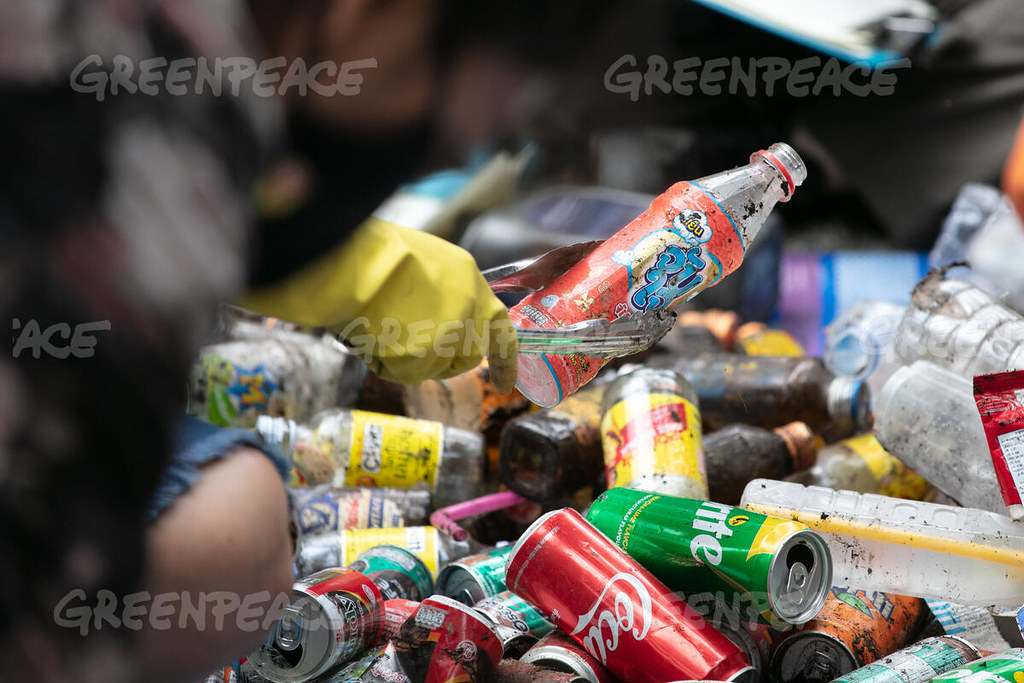Five Thai companies, namely, Charoen Pokphand Group (CP), Dutch Mill Co., Ltd., Osotspa, TCP Group, and Lactasoy, have been identified as the top plastic polluters locally responsible for plastic pollution affecting two provinces, according to the latest brand audit report conducted by Greenpeace Thailand.

Greenpeace volunteers collect and sort garbage collected from Doi Suthep in Chiang Mai, Thailand. (Photo credit:Wason Wanichakorn / Greenpeace)
Pichmol Rugrod, Plastic Project Leader for Greenpeace Thailand said:
“This is the third time that Greenpeace Thailand has conducted a plastic brand audit and we continue to find the same types of plastic from the same brands in the environment. Single-use plastic has devastating effects not only to nature but to frontline communities as well. There will be no solutions to the plastic crisis unless there is a plan to urgently reduce plastic consumption and production. Just like a pandemic response, real actions are needed to tackle plastic pollution- from its source and throughout the plastic’s life cycle. In addition, corporations must take full responsibility for the pollution they have caused, taking into account the externalized cost of their single-use plastic products- such as the cost of waste collection treatment, their continued contribution to greenhouse gas emissions and the irreparable environmental damage that will continue to harm people and biodiversity for years to come.”
Penchom Saetang, the Executive Director of Ecological Alert and Recovery-Thailand or EARTH Foundation said:
“The most important thing in managing and preventing plastic pollution is to apply extended producer responsibility (EPR). Currently the Thai government has a plastic management roadmap 2018-2030, model scheme, and relevant measures needed to implement the plans under the ASEAN framework action on marine debris. Meanwhile, the corporate sector has initiated and rolled out a circular economy policy. However, these policies are based on a voluntary basis and are non-legally binding. Without law enforcement, it is therefore difficult to gain buy-in from every company for the plastic crisis to be solved. Moreover, the government has not been proactive to motivate all stakeholders, including the private and public sectors and local governments, to join forces and seriously tackle the problems.”
The latest brand audit saw more than 70 volunteers join the activities that took place in Doi Suthep, Chiang Mai province and Wonnapa beach in Chonburi province. A total of 13,001 pieces of plastic waste were collected: 8,489 of which were food packaging and 3,273 of which were household products [1].
Amidst the Covid-19 pandemic, other brand audits safely took place in 55 countries, with brands like The Coca-Cola Company, PepsiCo and Nestlé identified as the world’s top plastic polluters for the 3rd consecutive year. The brand audit is part of the #BreakFreefromPlastic global movement which aims to reduce the single-use plastic reduction and put an end to the plastic pollution crisis.
Greenpeace Thailand is calling on corporations, specifically the Fast Moving Consumer Goods (FMCG) sector and other companies to apply the extended producer responsibility policy, implement a plastic footprint reduction plan and phase out unnecessary single-use plastics which continue to pollute our environment by prioritising the following actions:
- Be transparent and traceable : Publicly disclose comprehensive information about the types and amount of plastic they use, their plans to apply refill, reduce and reuse principles. Annually monitor its progress and assess its plastic waste disposal by independent organisations or institutions;
- Commit to plastics reduction plan : Set annual targets for continually reducing their single-use plastic footprint towards complete phase out. Make significant investment in creating refillable, reusable containers and the innovation of new delivery systems that minimise the need for single- use plastic packaging. The plan shall be actionable, transparent, measurable, time bound and can be accessible by public and stakeholders;
- Urgently eliminate problematic and unnecessary plastic : Begin reduction efforts by eliminating the most problematic and unnecessary single-use plastics with time-bound plan;
- Invest in reuse and alternative delivery systems
- Apply extended producer responsibility (EPR) principle throughout the products’ lifecycle : Keep monitoring social and environmental impacts on local communities. Include ‘marine debris’ as one factor to assess environmental impacts caused by the products.
Note:
1. Some 3,763 pieces of plastic collected belonged to the ‘Other’ category (or Plastic Number 7), which often includes multi-layer plastics and also plastics that may be layered or mixed with other types of plastics. Next were 2,740 pieces of plastic that were identified as High Density Polyethylene or HDPE plastic, followed by 1,851 pieces of plastic that were identified as Polypropylene or PP plastic.
Prachatai English is an independent, non-profit news outlet committed to covering underreported issues in Thailand, especially about democratization and human rights, despite pressure from the authorities. Your support will ensure that we stay a professional media source and be able to meet the challenges and deliver in-depth reporting.
• Simple steps to support Prachatai English
1. Bank transfer to account “โครงการหนังสือพิมพ์อินเทอร์เน็ต ประชาไท” or “Prachatai Online Newspaper” 091-0-21689-4, Krungthai Bank
2. Or, Transfer money via Paypal, to e-mail address: [email protected], please leave a comment on the transaction as “For Prachatai English”
